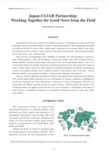Keynote Speech:Japan-CGIAR Partnership: Working Together for Good News from the Field
JIRCAS international symposium series
| ISSN | 13406108 |
|---|---|
| NII recode ID (NCID) | AA1100908X |

Full text
intlsymp-12_19-26.pdf1.16 MB
Agricultural scientists have achieved remarkable successes in developing new crop a nd farming technologies that have benefited millions of farmers in developing countries. These technologies, developed by mobilizing the best of science within a public goods' framework, have increased yields of basic crops, boosted farmer incomes, created a virtuous cycle of on-farm and off-farm benefits, and promoted the prudent use of vital resources such as land and water.
These successes notwithstanding, future challenges are daunting. The world population is expected to reach 9 billion people by 2050, and food demand is expected to double. Some 30% of irrigated lands are already degraded. And there are big changes taking place in the world of agricultural science. A new set of science-based solutions are urgently required for increasing the productivity (per area and per unit of input) of crops, livestock, fisheries and forests while reducing environmental degradation in industrial and developing countries. Developing countries need to mobilize resources in the broadest sense of the term - human, financial, scientific, and proprietary knowledge - to help meet the challenges of development.
Japan is a leader in supporting international science-for-development efforts. Japan joined the CGIAR in 1972, and the Japan-CGIAR partnership rests on a solid platform of scientific cooperation as highlighted in the Koizumi Initiative and Tokyo International Conference for African Development (TICAD 3). In partnership with JIRCAS and other advanced research institutes, CGIAR scientists and partners have conducted strategic and applied research that has led to the development of technologies and products of major relevance to agricultural development. For sustainable development to become a reality, these efforts must continue.
These successes notwithstanding, future challenges are daunting. The world population is expected to reach 9 billion people by 2050, and food demand is expected to double. Some 30% of irrigated lands are already degraded. And there are big changes taking place in the world of agricultural science. A new set of science-based solutions are urgently required for increasing the productivity (per area and per unit of input) of crops, livestock, fisheries and forests while reducing environmental degradation in industrial and developing countries. Developing countries need to mobilize resources in the broadest sense of the term - human, financial, scientific, and proprietary knowledge - to help meet the challenges of development.
Japan is a leader in supporting international science-for-development efforts. Japan joined the CGIAR in 1972, and the Japan-CGIAR partnership rests on a solid platform of scientific cooperation as highlighted in the Koizumi Initiative and Tokyo International Conference for African Development (TICAD 3). In partnership with JIRCAS and other advanced research institutes, CGIAR scientists and partners have conducted strategic and applied research that has led to the development of technologies and products of major relevance to agricultural development. For sustainable development to become a reality, these efforts must continue.
| Creator | Francisco Reifschneider |
|---|---|
| Publisher | Japan International Research Center for Agricultural Sciences |
| Available Online | |
| Issue | 12 |
| spage | 19 |
| epage | 26 |
| Language | eng |
